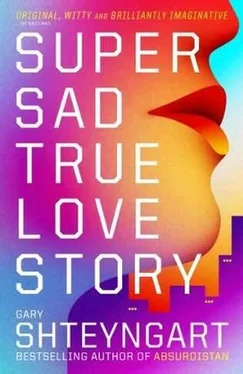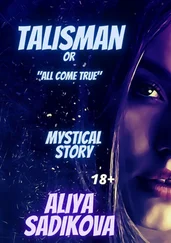At the office, Kelly Nardl was crying over the riots, while the young folk in the Eternity Lounge were deep into their äppäräti, teeth grinding, sneaker-clad feet crossed, unsure of how to interpret all the new information pouring over them like warm summer pop, everyone awaiting Joshie’s cue. The Guard had cleared a part of the park and let in Media. I was watching Noah’s stream as he ambled up and down Cedar Hill, past the remnants of tarps and somber, amoeba-shaped pools of real-time blood on the tired grass, which made Kelly whimper all over her tempeh-covered desk. She was a touchstone of honest emotion, our Kelly. I took my turn petting her head and inhaling her. One day, if our race is to survive, we will have to figure out how to download her goodness and install it in our children. In the meantime, my mood indicators on The Boards went from “meek but cooperative” to “playful/cuddly/likes to learn new things.”
Joshie had called a full organizational meeting, Cowboys and Indians. We walked to the Indians’ auditorium on York Avenue, significantly larger than our synagogue’s main sanctuary, Joshie leading us past the checkpoints with one hand raised up in the air, like a schoolteacher on a field trip. “Pointless loss of life,” he said once installed at the dais, sipping eloquently from his thermos of unsweetened green tea, as we regarded him multiculturally from our plush reclining seats. “Loss of prestige for the country. Loss of tourist yuan. Loss of face for our leadership, as if they had any face to lose. And for what? Nothing has been achieved in Central Park. When will the Bipartisans realize that killing Low Net Worth Individuals will not reverse this country’s trade deficit or cure our balance-of-payment problems?”
“Truth to power,” Howard Shu brown-nosed behind him, but the rest of us remained quiet, perhaps too shocked by the latest turn of history to find succor even in Joshie’s words. Nonetheless, I smiled timidly and waved, hoping he would notice me.
“The dollar has been grossly, fantastically mismanaged,” Joshie went on, his usual bemused conversational face coiled by the kind of rage that wasn’t allowed at Post-Human Services, a rage decidedly pre -human, parts of his chin shaking independently, so that from one angle he looked thirty years old and from another sixty. “The ARA has tried a dozen different economic plans in as many months. Privatization, deprivatization, savings stimulus, spending stimulus, regulation, deregulation, pegged currency, floating currency, controlled currency, uncontrolled currency, more tariffs, less tariffs. And the net result: bupkis . ‘The economy has still not achieved traction,’ to quote our beloved Fed chairman. As we speak, in HSBC-London, the Chinese and the EU are in final partnership talks. We are finally no longer critically relevant to the world economy. The rest of the globe is strong enough to decouple from us. We, our country, our city, our infrastructure, are in a state of freefall.
“But,” Joshie said. And here he breathed in deeply, smiled sincerely, the dechronification treatments coming to life on his face, glowing eyes, glowing dome, glowing skin-we moved slightly to the edge of our seats, fingered our cup holders suggestively. “We have to remember that our primary obligation is to our clients. We have to remember that all those who died in Central Park over the last few days were, in the long run, ITP, Impossible to Preserve. Unlike our clients, their time on our planet was limited. We must remind ourselves of the Fallacy of Merely Existing, which restricts what we can do for a whole sector of people. Yet, even though we may absolve ourselves of responsibility, we, as a technological elite, can set a good example. I say to all the naysayers: The best is yet to come.
“Because we are the last, best hope for this nation’s future.
“We are the creative economy.
“And we will prevail!”
There were murmurs of assent from the Cowboys, while the Indians were lowing to get back to their work. I confess my mind was elsewhere too, despite the importance of what Joshie was saying, despite the pride I felt at being a part of this creative economy (a pride verging on the patriotic), and despite the guilt I felt about the deaths of the poor people. That night I was going to meet Eunice Park’s parents.
I had never dressed for church before, and my synagogue days were a quarter of a century behind me, Yahweh be praised. Not one of my friends had ever met exactly the right person (Grace and Vishnu excepted), so there was never a need to dress up for a wedding. I foraged deeply into the recesses of the one closet not ceded to Eunice’s shoes to find a suit jacket made out of what may have been polyurethane, a silvery number I had used at speech and debate tournaments in high school, one that always won me sympathy points from the judges because I looked like an entry-level pimp from a degentrified part of Brooklyn.
Eunice scrutinized me with unbelieving eyes. I leaned over to kiss her, but she pushed me away. “Act like a roommate, okay?” she said.
The protocol of the meeting, the roommate charade, weighed on me, but I chose not to worry over it. The Parks were immigrant parents. I would convince them of my financial and social worth. I would press their emotional panic buttons with the briskness I reserve for entering my bank code. I would make them understand that in these troubled times they could count on a white guy like me to steward their daughter.
“Can I at least tell your sister that we’re more than roomies?” I asked Eunice.
“She knows.”
“She knows?” A small victory! I reached over and buttoned the silky white work shirt Eunice had put on, and she kissed me on both hands as I was fitting the buttons into the elaborate loops.
The worship service was to be held in one of the Madison Square Garden auditoriums, an overlit yet fundamentally dark amphitheater suitable for maybe three thousand persons, but today filled with half as many. The heavy use of lights exposed the dinginess of the place, the facilities barely swept from the last event, which may well have been a licorice convention. Most attendees were Korean, with the exception of the few Jewish and WASPish young men brought in by their girlfriends. Teenagers wearing bright-green sashes with the words “Welcome to Reverend Suk’s Sinners’ Crusade” greeted us and bowed to their elders. Crisply dressed kids, their äppäräti confiscated by their parents, horsed around quietly between our feet, playing simple coeducational games with thumbtacks and adhesive tape, a lone grandmother deputized to watch over the lot of them.
I felt my monstrous suit jacket glowing around my shoulders, but the middle-aged women with elaborate permed hair and shoulder-padded suit jackets, the ajummas, a sometimes derisive term for married women I picked up from Grace, made me feel better about myself. Together we all looked like we had been plucked from the distant decade of 1980-89 and deposited into this dull, awkward future, a bunch of poorly dressed sinners throwing ourselves at the mercy of Christ, who was always sharp-looking and trim, graceful in pain, kindly in Heaven. I’d always wondered if the Son of God didn’t harbor a wide hatred for ugly people, his pleasant teachings notwithstanding. His liquid blue eyes had always hurt me to the quick.
Eunice and I walked to our seats, maintaining a “roommate-like” decorum, at least three feet of dusty atmosphere between us at all times. Middle-aged men, exhausted from ninety-hour work weeks, were slumped deep into their chests, shoes off, catching precious sleep before the onslaught of prayer began. I got the sense that these weren’t the A-level Koreans, most of whom had returned to the motherland after the economic scales had tipped toward Seoul. These must have been people from the poorest provinces, those who couldn’t gain admittance to the finer universities in their home country, or those who had broken horribly with their families. The era of the Korean greengrocers I had known as a child had pretty much come to a close, but the people around me were less assimilated, still close to the tremulously beating heart of the immigrant experience. They owned small businesses outside the golden zone of Manhattan and Brownstone Brooklyn, they struggled and calculated, they pushed their children over the edge of sleep deprivation-there would be no shameful 86.894 weighted averages among them, no talk of Boston-Nanjing Metallurgy College or Tulane.
Читать дальше












